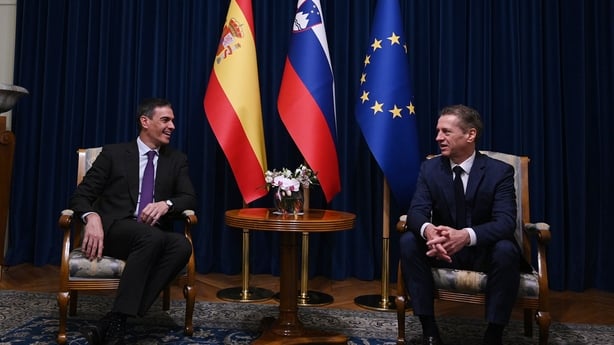The Slovenian government has approved a decision to recognise an independent Palestinian state, Prime Minister Robert Golob said, following in the steps of Ireland, Spain and Norway.
"Today the government has decided to recognise Palestine as an independent and sovereign state," he said at a news conference in Ljubljana.
The parliament of the European Union member state must also approve the government's decision in coming days.
Slovenian politicians will vote next Tuesday on whether to recognise a Palestinian state, the parliament speaker Urška Klakočar Zupančič told a press conference in Ljubljana this afternoon.
The move is part of a wider effort by countries to coordinate pressure on Israel to end the conflict in Gaza.
Mr Golob also called for the immediate cessation of hostilities between Israel and Hamas in Gaza and the release of all hostages.
"This is the message of peace," he said.
Israeli Foreign Minister Israel Katz said that he hoped Slovenian politicians will reject recognising a Palestinian state, saying a yes vote next week would be a "reward" to Hamas.
"The Slovenian government's decision to recommend that the Slovenian parliament recognise a Palestinian state rewards Hamas...I hope the Slovenian parliament rejects this recommendation," Mr Katz said on X.
The Slovenian government raised a Palestinian flag alongside the flags of Slovenia and the EU in front of its building in central Ljubljana.
On Tuesday, Ireland, Spain and Norway officially recognised a Palestinian state, prompting an angry reaction from Israel.
Of the 27 members of the European Union, Sweden, Cyprus, Hungary, the Czech Republic, Poland, Slovakia, Romania and Bulgaria have already recognised a Palestinian state. Malta has said it could follow soon.

Britain and Australia have also said they are considering recognition but France has said now is not the time.
However, French President Emmanuel Macron yesterday offered the "prospect of recognition of the State of Palestine" during a phone call with Palestinian Authority chief Mahmoud Abbas if he implemented "necessary reforms" of the organisation.
Germany joined Israel's staunchest ally, the United States, in rejecting a unilateral approach, insisting that a two-state solution can only be achieved through dialogue.
Denmark's parliament on Tuesday voted down a bill to recognise a Palestinian state.
Norway, which chairs the international donor group to the Palestinians, had until recently followed the US position but has lost confidence that this strategy will work.
Israel has been fighting against Hamas, which rules Gaza, since a cross-border 7 October attack by militants in which around 1,200 people were killed and over 250 taken hostage, according to Israeli tallies.
Nearly 130 hostages are believed to remain captive in Gaza.
Gaza health authorities say more than 36,000 Palestinians, mostly civilians, have been killed by Israel over the past seven months.

